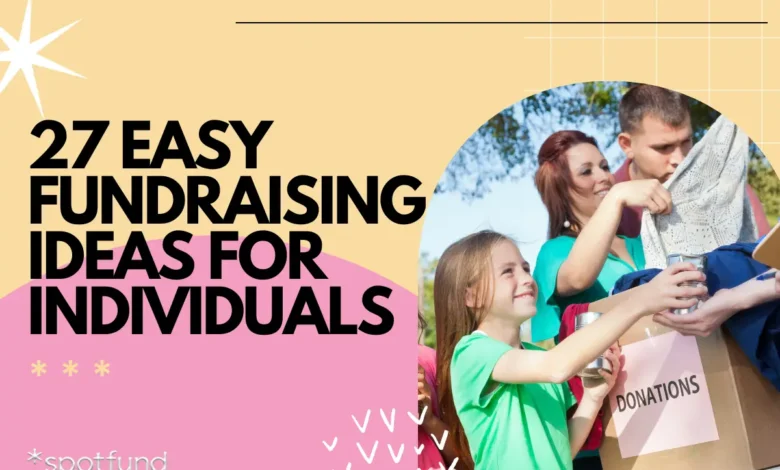Fundraising as an Individual: A Complete Guide to Making a Difference

Fundraising as an individual can seem daunting at first, but with the right approach, it’s a powerful way to create change, support meaningful causes, or reach personal goals. Whether you’re rallying support for a charitable cause, medical expenses, or an educational pursuit, this guide will help you understand how to raise funds successfully on your own. While many believe fundraising is reserved for organizations, individuals have immense power to make an impact. With creativity, persistence, and heart, anyone can run a successful personal campaign.
What Does Fundraising as an Individual Mean?

Fundraising as an individual refers to raising money independently for a specific goal or cause. Unlike organizational fundraising, personal campaigns rely heavily on one person’s ability to connect with donors. This process requires building trust, sharing a compelling story, and using various platforms to communicate needs.
Some common reasons individuals may start fundraising include:
- Medical or emergency expenses
- Educational opportunities or tuition fees
- Supporting a community project
- Donations for a charitable event (e.g., marathons or challenges)
- Disaster relief efforts or environmental causes
The key to successful individual fundraising is transparency. Let your donors know exactly where their money is going and why it’s important.
Why Choose Fundraising as an Individual Over Organizational Support?
Raising funds independently offers several advantages:
- Personal Connection: Fundraising as an individual allows for direct interaction with donors, making it easier to share your story and inspire support.
- Creative Freedom: You’re free to explore innovative methods to engage your audience, such as hosting personal events, creating online challenges, or launching raffles.
- Quicker Setup: Unlike nonprofits, individual fundraisers don’t need formal registration, reducing paperwork and speeding up the process.
While it’s not without its challenges, the flexibility of individual campaigns makes it a popular choice for those who need to act quickly or don’t have access to organizational resources.
How to Start Fundraising as an Individual
Every fundraiser begins with clear intentions and proper planning. Here’s a step-by-step breakdown:
- Define Your Goal
- Be Specific: Identify the amount of money you need to raise and explain how it will be used.
- Set a Timeline: Establish deadlines to create urgency and keep yourself on track.
- Break It Down: If your goal seems large, divide it into smaller, more achievable milestones.
- Craft Your Story
People are more likely to donate if they connect emotionally with your cause. Craft a story that’s:
- Authentic: Share personal experiences or the inspiration behind your cause.
- Compelling: Use vivid descriptions to convey the urgency of your need.
- Concise: Stick to the main points, but don’t forget to make it heartfelt.
Choosing the Right Fundraising Platforms
Selecting the right platform is crucial when fundraising as an individual. Some platforms specialize in personal causes, while others cater to events or projects. Here’s a quick comparison:
PlatformBest ForFee StructureFeatures
GoFundMe Medical expenses, emergencies 0% platform fee, 2.9% + $0.30 per donation Wide reach, easy sharing tools
Kickstarter Creative projects, new ventures 5% platform fee + processing fees All-or-nothing funding model
Give butter Nonprofits and community events Optional platform fee + processing fees Built-in ticketing and event features
Fundly Personal fundraising campaigns 4.9% platform fee + payment fees Customizable pages, recurring donations
Choose a platform that aligns with your fundraising goals and offers transparency for both you and your donors.
Strategies to Boost Your Fundraising Efforts
Fundraising is as much about strategy as it is about storytelling. Here are some tried-and-true techniques to enhance your campaign:
- Leverage Social Media
Platforms like Instagram, Facebook, and Twitter allow you to reach larger audiences quickly. Use these tips:
- Create a Campaign Hashtag: Make it easy to follow and share your cause.
- Post Regular Updates: Let your supporters know how close you are to your goal.
- Go Live: Engage your audience in real time by sharing updates or hosting Q&A sessions.
- Offer Incentives
Giving donors a little extra can go a long way. Consider:
- Personalized Thank-You Notes
- Shoutouts on Social Media
- Exclusive Updates or Content
- Collaborate with Influencers
If you have access to local influencers or supporters with large followings, ask them to share your fundraiser. Their audience might resonate with your cause.
Overcoming Challenges in Personal Fundraising
Fundraising as an individual isn’t always smooth sailing. Here are a few hurdles you might face and ways to overcome them:
- Donor Fatigue: If your audience feels overwhelmed by constant requests for donations, switch tactics by engaging them with updates or non-monetary support options.
- Limited Reach: Start with your close networks and encourage them to share your campaign within their circles to broaden visibility.
- Slow Donations: Create urgency by offering matching campaigns or flash donation goals.
How to Engage and Retain Donors
Donor engagement doesn’t stop at receiving funds. Keep your supporters in the loop and make them feel valued by:
- Sending Regular Updates: Share milestones or new developments related to the cause.
- Creating Personalized Thank-You Messages: Acknowledging their contribution can encourage future donations.
- Inviting Donors to Follow-Up Events: Offer a way for them to stay involved with your cause beyond financial support.
Legal and Ethical Considerations in Fundraising as an Individual
Fundraising, even on an individual level, comes with responsibilities. Ensure your campaign stays within ethical and legal boundaries:
- Disclose Your Intentions: Be clear about where the funds will go and how they’ll be used.
- Avoid Misleading Claims: Keep your messaging honest to maintain trust with donors.
- Comply with Local Regulations: Depending on your location, personal fundraising may require specific licenses or registrations.
The Power of Optimism and Resilience
The road to successful fundraising as an individual may not always be easy. But with the right mindset, determination, and support, every small step forward can create meaningful change. Stay motivated by:
- Celebrating Milestones: Acknowledge even small donations as wins.
- Learning from Setbacks: If a strategy doesn’t work, tweak it and try again.
- Expressing Gratitude: Gratitude is contagious, and donors who feel appreciated are more likely to give again.
Final Thoughts on Fundraising as an Individual
Fundraising as an individual allows you to take charge, turn ideas into action, and make a tangible difference. Whether you’re raising money for a personal cause or supporting someone in need, every contribution matters. Start with a clear goal, communicate your story authentically, and connect with your supporters. Remember, success isn’t always about the amount raised—it’s about the journey, the impact, and the community you build along the way.
So, dive in with confidence, reach out to your network, and let your passion shine. Fundraising as an individual is not just about gathering donations—it’s about sharing hope, inspiring others, and bringing positive change to the world around you.
